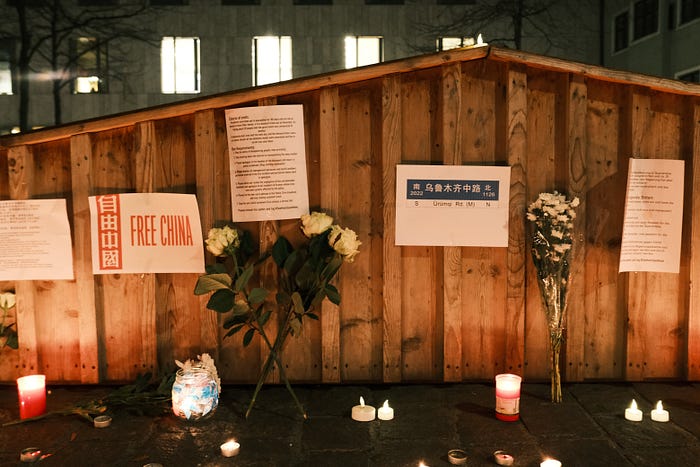With so much trouble at home, the CCP is under more pressure than ever.

U.S. Secretary of State Anthony Blinken will travel to the Middle East over the coming weekend amid mounting tensions between Israel and the Palestinian Authority.
“Tensions between Israelis and Palestinians have soared since Israel launched the nightly raids in the West Bank last spring, following a spate of Palestinian attacks,” wrote Matthew Lee for the Associated Press yesterday. “The conflict has only intensified this month, as Netanyahu’s government came to office and pledged to take a hard line against the Palestinians.”
Besides violating its own stylebook’s new guidelines, and being overly broad in its description of “the Palestinians,” the Associated Press should consider a second hotspot of escalating conflict.
The South China Sea.
The Chinese Communist Party seems to be a bit cowed at the moment after its failure to achieve zero Covid coincided with a failure to prevent massive, widespread protests over its draconian lock-down policies.
Does the CCP’s new would-be softened tone extend to Taiwan?
Many world leaders, press organizations, and foreign policy experts aren’t convinced.
“Will the U.S. Really Defend Taiwan?” asked Seth Cropsey for the Wall Street Journal on January 26, 2023, echoing a common, if troubling, question. In the opinion of Cropsey and plenty of others, “Washington is strategically unprepared for a crisis and Biden’s policies are hampering deterrence.”
Besides his contradictory and sometimes incendiary foreign policy gaffes, “The Biden administration’s approach to military investments is also sending China mixed signals,” frets Cropsey.
While Taiwan is trying a radical new strategy to keep the Chinese Communist Party at bay, Taiwan’s president said last week that war between Taiwan and China is, “not an option.”
“Armed confrontation is absolutely not an option,” Taiwanese President Tsai Ing-wen wrote in a letter to Pope Francis. “Only by respecting the commitment of the Taiwanese people to our sovereignty democracy and freedom can there be a foundation for resuming constructive interaction across the Taiwan Strait.”
Some military experts have been warning of escalation via a kind-of slow scale invasion, which would start gradually, much as Vladimir Putin sought to do with Ukraine for over a decade prior to the all-out military invasion he launched in 2022.
“When I was asked about this in 2021, at the Senate hearing, I was asked not about an invasion of Taiwan,” former head of the U.S. military’s Indo Pacific Command, ret. Admiral Phillip Davidson told the Japan Times last Wednesday. “I was asked about any potential conflict with Taiwan. What does that include? In my mind, that can be many lesser things than an all-out invasion. One of those would be threats to outer islands, and I think it’s a grave security concern of Taiwan.”
In recent years, Chinese military planes, ships, and drones have indeed pushed further, and more often, into sovereign Taiwanese territory.
What does CCP director Xi Jinping — and since he did away with any mechanisms by which he could be replaced, Xi Jinping’s successor, Xi Jinping- hope to achieve by threatening Taiwan?
It wasn’t to hurt the United States or even Taiwan. Neither of those sovereign nations is his biggest threat. Far from it.
The CCP’s ultimate goal is the continued oppression of 1.6 billion Chinese people.
The only way a tiny handful of people control a nation of 1.6 billion is with the consent of the governed.
And Xi Jinping doesn’t have that.
A ruler with the consent of the governed doesn’t need the most advanced surveillance state in the history of the world. Someone with the consent of the governed wouldn’t need the Great Firewall of China. They wouldn’t need to abuse the Interpol system with phony notices so the CCP can collect Chinese political dissenters worldwide.
A ruler with the consent of the governed wouldn’t need to silence a famous tennis player who accused a member of the CCP of sexual abuse.
The Chinese Communist Party, and its ruler Xi Jinping, are vulnerable; their power is growing more brittle. The CCP needs a foreign adversary to undermine; a common, national cause around which to rally.
The news cycle this week has been filled with stories about a recent U.S. war game simulation that suggested a Chinese invasion of Taiwan would ultimately fail at a huge cost to the People’s Liberation Army.
Such a scenario, it must also be admitted, would cost the allied forces of the United States, Taiwan, and Japan a great deal as well.
U.S. Secretary of State Anthony Blinken isn’t unaware of the growing challenges posed by the CCP’s plan to annex Taiwan by force.
Asked about rising tensions during an appearance at the University of Chicago on January 22, 2023, Blinken had a great deal to say on the subject.
“What we’ve seen over the last few years, I think, China make the decision that it was no longer comfortable with the status quo, a status quo that had prevailed for decades that had actually been successful in terms of the relationship between our countries and managing what is a difficult situation,” Sec. Blinken admitted on the subject of potential escalation.
“What we say to China is this — they say this is a sovereign issue for us; our response is this is an interest to the United States and to countries around the world,” Mr. Blinken went on, predicting that any disruption in the South China Sea between China and Taiwan would be catastrophic to the world economy.
(contributing writer, Brooke Bell)